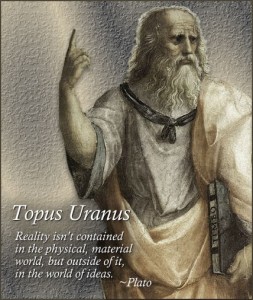 For you scholars out there: Have you ever heard of a term called “Topus Uranus?” It’s a term used by the Greek philosopher Plato and refers to his world of ideas where, according to him, reality is found. He argued that reality isn’t contained in the physical, material world, but outside of it, in the world of ideas. The material world is really only a reflection of what is in the world of ideas.
For you scholars out there: Have you ever heard of a term called “Topus Uranus?” It’s a term used by the Greek philosopher Plato and refers to his world of ideas where, according to him, reality is found. He argued that reality isn’t contained in the physical, material world, but outside of it, in the world of ideas. The material world is really only a reflection of what is in the world of ideas.
Sound at all familiar?
Personal Development Today
As the personal development industry has evolved, especially within the past decade, terms such as the “law of attraction” and “the secret” have surfaced. These terms have spread like wild fire inside and outside the home based business industry. People were given the idea that they could attract absolutely anything they desired into their life through their focused thoughts. Basically, if a person could hold a concentrated thought for long enough that the “universe” would present this desire in physical form. Now… hold that thought for a moment while I go on.
The Allegory of the Cave
Topus Uranus is a dialogue between Socrates, Plato’s teacher, and Plato. In this dialogue, Socrates explains the Allegory of the Cave, sometimes known as Plato’s Cave, which further explains the meaning of Topus Uranus. It refers to a group of prisoners being chained to a wall in a cave to the point where all they can look upon is the rock of that wall. As people pass by the fires behind them, all they see are shadows being cast on the wall. The prisoners only know what the shadows on the wall look like. That’s their reality. That’s how they discern one thing from the next.
Suppose that a prisoner is freed and permitted to stand up and gaze around the cave. If someone were to show him the things that had cast the shadows on the wall, he wouldn’t recognize them. He couldn’t name them and would believe the shadows on the wall more than what lies before him. That’s his reality. Better yet, what would happen if that man was forced to look at the fire that once burned behind him? He would be struck blind and would try to turn his gaze back to the shadows on the wall, because that’s what he can see clearly. The shadows are real to him, not everything else. He wouldn’t be able to recognize an animal in real form over the shadow it cast upon the wall.
What if someone were to drag this prisoner out of the cave into the sunlight. Everything that he once knew to be real was only a figure on a rock wall. Do you think this prisoner would have an anxiety attack? He’d be a little distressed, wouldn’t he?
After some time on the surface, the prisoner would acclimate and learn. His eyes would eventually be able to look into the sun and realize that it is the source of warmth and light. He would learn a different reality. He would learn that his old reality, once just shadows on a cave wall, is no more his reality. His eyes have been opened, but only because he believed and accepted what he was shown. Fear could have overcome him and pushed him back into the cave where he came from…back to the reality he had known for so long.
So here are a few thought provoking questions:
Do your thoughts really create your reality? If so, are your thoughts and ideas hindering you? Is your reality at this very moment serving you? Is there another reality for you? If so, when are you going to decide to change your reality and how?
We have all heard of the common phrase, “The best place to start improving is in the space right between your ears.” Paraphrased of course. To change your reality, the change must, I say MUST start in your mind. The way we think and view our surroundings is our reality. What one man considers to be junk, another considers to be treasure. Some people can create nothing out of the same thing others can use to create amazing things. It’s all in our perception of what is possible and what is not.




